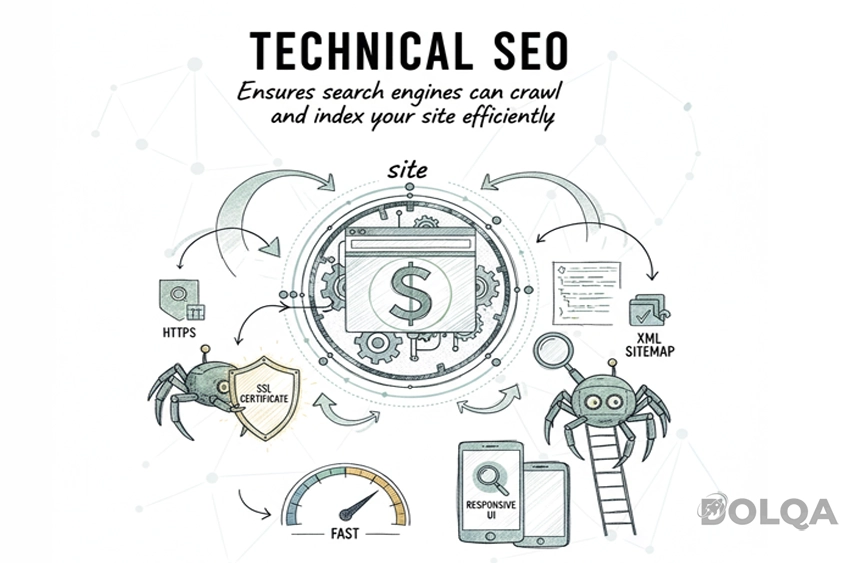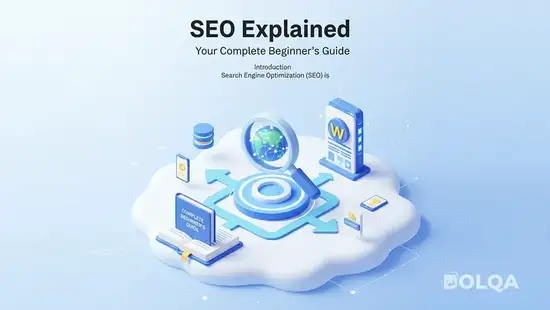Introduction
Search Engine Optimization (SEO) is the practice of improving your website to increase its visibility when people search for products or services related to your business on search engines like Google, Bing, and Yahoo. When executed properly, SEO helps your site rank higher in search results, bringing more organic traffic to your pages. This comprehensive SEO explanation will walk you through everything you need to know as a beginner, from fundamental concepts to actionable strategies you can implement immediately.
What is SEO and Why Does It Matter?
SEO stands for Search Engine Optimization—a collection of techniques designed to help search engines understand, index, and rank your website content. Think of search engines as massive libraries, and SEO as your way of organizing your books so they're easy to find and recommend to visitors.
Why SEO is crucial for your online success:
- Increased Visibility: Higher rankings mean more people see your website
- Quality Traffic: SEO attracts users actively searching for what you offer
- Cost-Effective Marketing: Unlike paid ads, organic traffic doesn't require continuous spending
- Credibility and Trust: Users trust websites that appear on the first page of search results
- Better User Experience: Good SEO practices improve your site for visitors too
How Search Engines Work
Before diving into SEO strategies, understanding how search engines operate helps you optimize effectively. Search engines follow a three-step process:
Crawling
Search engine bots (also called spiders or crawlers) continuously scan the internet, following links from page to page to discover new and updated content.
Indexing
After crawling, search engines analyze and store the content in their massive databases. They examine text, images, videos, and page structure to understand what each page is about.
Ranking
When someone searches, the search engine retrieves relevant pages from its index and ranks them based on hundreds of factors, displaying the most relevant and authoritative results first.
Core SEO Components Every Beginner Should Know
On-Page SEO
On-page SEO refers to optimizations you make directly on your website to improve rankings:
1. Keyword Research and Usage
- Identify terms your target audience searches for
- Use keywords naturally in titles, headings, and content
- Focus on search intent—what users want to find
2. Title Tags and Meta Descriptions
- Craft compelling titles with your primary keyword
- Write descriptive meta descriptions that encourage clicks
- Keep titles under 60 characters and descriptions under 160
3. Header Tags (H1, H2, H3)
- Structure content with clear hierarchical headings
- Include relevant keywords in headers naturally
- Make headers descriptive and user-friendly
4. Content Quality
- Create comprehensive, valuable content that answers user questions
- Aim for originality—avoid duplicating content
- Update content regularly to maintain relevance
5. URL Structure
- Keep URLs short, descriptive, and keyword-rich
- Use hyphens to separate words
- Avoid unnecessary parameters and numbers
6. Internal Linking
- Link related pages within your website
- Use descriptive anchor text
- Help search engines understand site structure
Off-Page SEO
Off-page SEO involves activities outside your website that impact rankings:
1. Backlinks
- Earn links from reputable websites in your industry
- Focus on quality over quantity
- Avoid purchasing links or participating in link schemes
2. Social Signals
- Share content on social media platforms
- Engage with your audience
- Build brand awareness and authority
3. Brand Mentions
- Get mentioned on other websites, even without links
- Build your online reputation
- Participate in industry discussions
Technical SEO
Technical SEO ensures search engines can crawl and index your site efficiently:
1. Site Speed
- Optimize images and compress files
- Use caching and content delivery networks
- Fast-loading pages improve rankings and user experience
2. Mobile-Friendliness
- Ensure your site works perfectly on smartphones and tablets
- Use responsive design
- Google prioritizes mobile-friendly sites
3. SSL Certificate (HTTPS)
- Secure your website with an SSL certificate
- HTTPS is a ranking factor
- Builds trust with visitors
4. XML Sitemap
- Create and submit a sitemap to search engines
- Helps crawlers discover all your pages
- Update regularly as you add content
5. Robots.txt File
- Control which pages search engines can crawl
- Prevent indexing of duplicate or unimportant pag

Essential SEO Tools for Beginners
Getting started with SEO is easier with the right tools:
- Google Search Console: Free tool to monitor your site's search performance
- Google Analytics: Track visitor behavior and traffic sources
- Google Keyword Planner: Research keywords and search volumes
- Ubersuggest: User-friendly keyword research and site analysis
- Yoast SEO: WordPress plugin for on-page optimization
- PageSpeed Insights: Test and improve your site speed
Common SEO Mistakes to Avoid
As you begin your SEO journey, watch out for these pitfalls:
- Keyword Stuffing: Overusing keywords unnaturally harms readability and rankings
- Ignoring Mobile Users: A non-mobile-friendly site loses significant traffic
- Neglecting Content Quality: Thin, low-value content won't rank well
- Buying Backlinks: Black-hat techniques can result in penalties
- Duplicate Content: Copying content confuses search engines
- Slow Loading Times: Users abandon slow sites, hurting your rankings
- Not Tracking Results: Monitor your progress to understand what works
Getting Started: Your First SEO Steps
Ready to optimize your website? Follow these actionable steps:
- Set Up Tracking: Install Google Analytics and Google Search Console
- Conduct Keyword Research: Identify 10-15 relevant keywords to target
- Optimize Existing Pages: Update title tags, meta descriptions, and headers
- Create Quality Content: Write helpful articles targeting your keywords
- Improve Site Speed: Compress images and enable caching
- Build Internal Links: Connect related pages throughout your site
- Monitor and Adjust: Review your analytics monthly and refine your strategy
Conclusion
Understanding SEO doesn't have to be overwhelming. This SEO explanation covers the fundamental concepts every beginner needs to start optimizing their website effectively. Remember, SEO is a long-term strategy—results don't happen overnight, but consistent effort pays off with increased visibility, traffic, and business growth.
Start implementing these techniques today, focus on creating valuable content for your audience, and stay updated with SEO best practices. Your journey to better search rankings begins with these foundational steps.
Ready to take your SEO to the next level? Share your questions in the comments below, and don't forget to bookmark this guide for future reference!







Comments (0)
Leave a Comment
No comments yet. Be the first to comment!